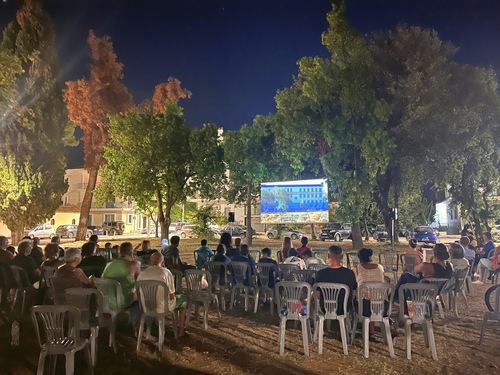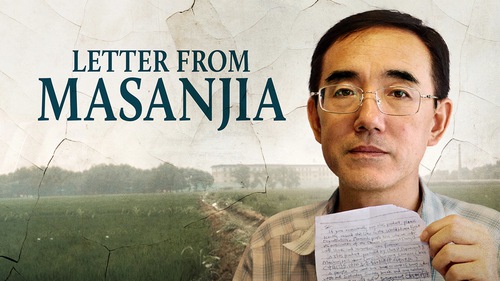(Minghui.org) The documentary Letter from Masanjia was screened at the Open-Air Film Festival in Oreoi, Greece, on August 1, 2023.
The documentary candidly recorded Falun Gong practitioner Sun Yi’s imprisonment in the notorious Masanjia Forced Labor Camp, where he was forced to make cheap Halloween decorations. He hid approximately 20 letters detailing the atrocities committed at Masanjia in the finished packages. Julie Keith, a mother in Oregon, found one of his letters. Her discovery set off a chain of events that led to international media attention.
 Documentary Letter from Masanjia was screened at the Open-Air Film Festival in Oreoi, a northern town on Evia Island, the second largest island in Greece.
Documentary Letter from Masanjia was screened at the Open-Air Film Festival in Oreoi, a northern town on Evia Island, the second largest island in Greece.
After he was released from the labor camp, Sun Yi used a camera to record his life under strict surveillance and show how the Chinese Communist Party (CCP) continued to persecute him. Based on scenes hand-drawn by Sun Yi, the film uses animation to recreate how he was made to do forced labor, how he was tortured, and how he wrote and concealed his letters for help while he was in the labor camp. The persecution of Falun Gong didn’t stop, however, and Sun Yi had to escape from China.
Letter from Masanjia was screened on the first day of the Open-Air Film Festival, which ran from August 1 to 7. The festival was organized by the Oreoi Cultural & Outdoor Association.
 Letter from Masanjia, published on the film’s official website
Letter from Masanjia, published on the film’s official website
 A Falun Gong practitioner answers questions from the audience.
A Falun Gong practitioner answers questions from the audience.
After the screening, Falun Gong practitioner Alia explained to the audience what Falun Gong is and how the CCP persecutes the practice in China. She then answered questions from the audience.
A man asked, “When prisoners [detained Falun Gong practitioners] are tortured, what must they do before they can be released?”
“They are forced to say that Falun Gong is not good and that they will give up practicing,” said Alia. “In fact, Falun Gong practitioners benefit physically and mentally by practicing Falun Gong, and it benefits their families, jobs, and society. Because of that, many practitioners would rather be tortured than say something that goes against their conscience.”
A woman asked what, in the digital age, could the Chinese do to end the CCP’s totalitarian rule and have more freedom.
Alia replied that Falun Gong practitioners never use violence, and all activities are peaceful. Chinese Falun Gong practitioners are like Sun Yi—they risk their lives to print leaflets and other materials to distribute and tell people who wonderful Falun Gong is and the facts about the CCP’s persecution. At the same time, Falun Gong practitioners outside of China use peaceful means, such as art shows, films, television, and live performances to spread the facts and undo the damage done by the CCP’s propaganda.
“China’s information blockade is strict, so what you have done is not easy. Bless you!” an audience member commented.
Alia said that all the media in China is controlled by the CCP, and people cannot freely use FaceBook, Twitter, YouTube, Google, etc. It is very difficult to obtain true information. If someone posts something on the Internet that the CCP doesn’t like, it will be deleted within seconds.
A man asked, “Why don't the people resist?”
Alia cited the Tiananmen Square self-immolation incident as an example to explain the CCP’s brutal methods of brainwashing and suppressing its people. Ordinary people either dare not resist or are brainwashed into believing in the CCP’s propaganda.
Alia also told the audience that some people in China do resist. Over the past 24 years, Falun Gong practitioners in China have continued to peacefully appeal, never stopping, just like the scenes in Letter from Masanjia. In addition, there are many other persecuted ethnicities and groups in China that are also protesting in different ways.
All content published on this website is copyrighted by Minghui.org. Minghui will produce compilations of its online content regularly and on special occasions.









